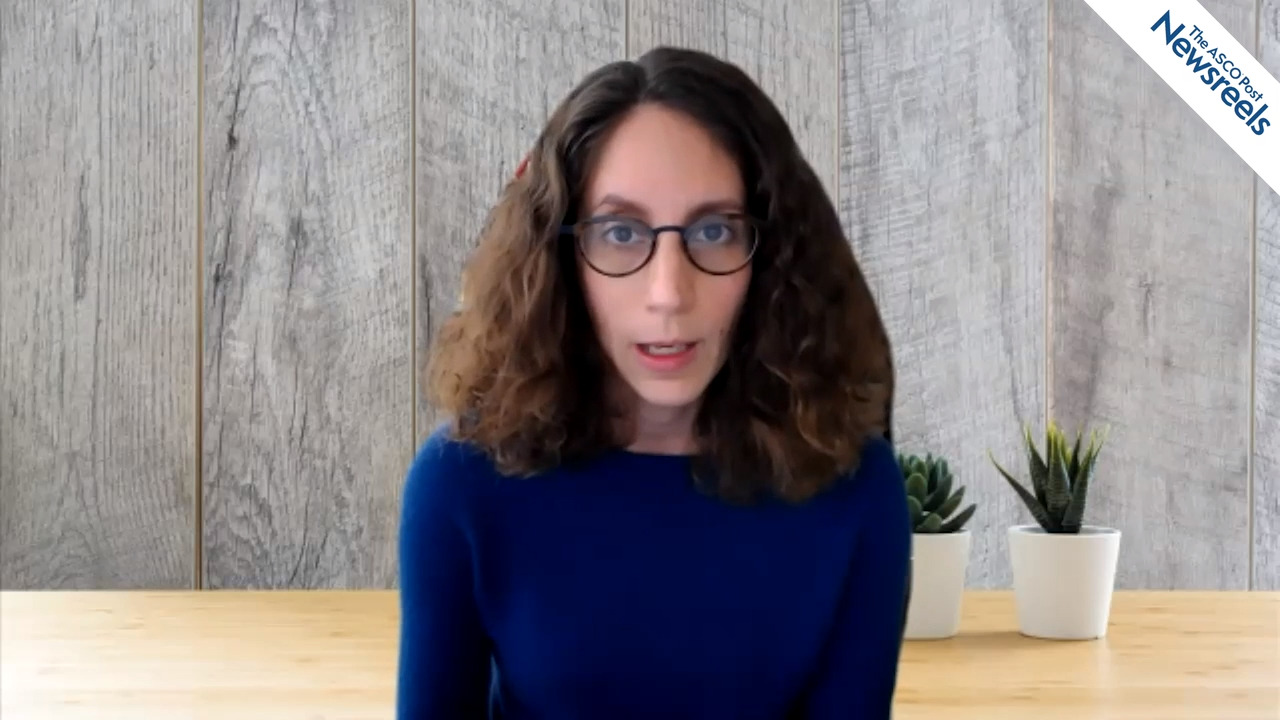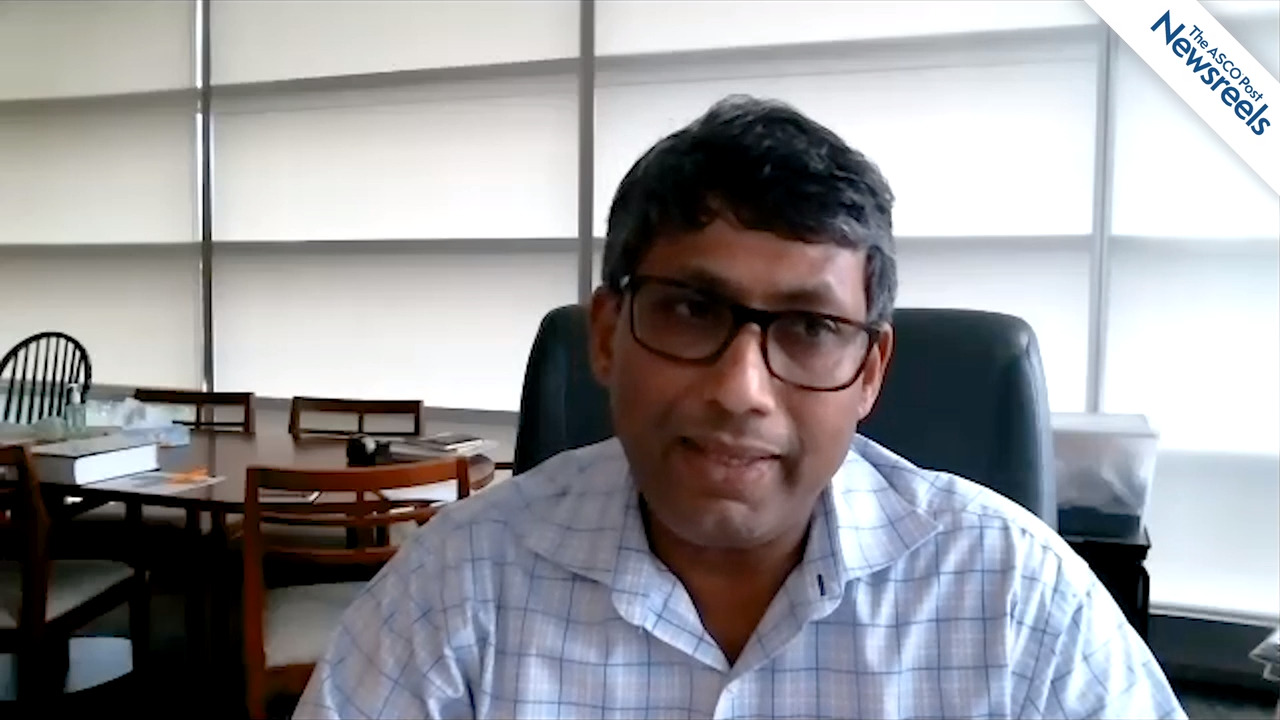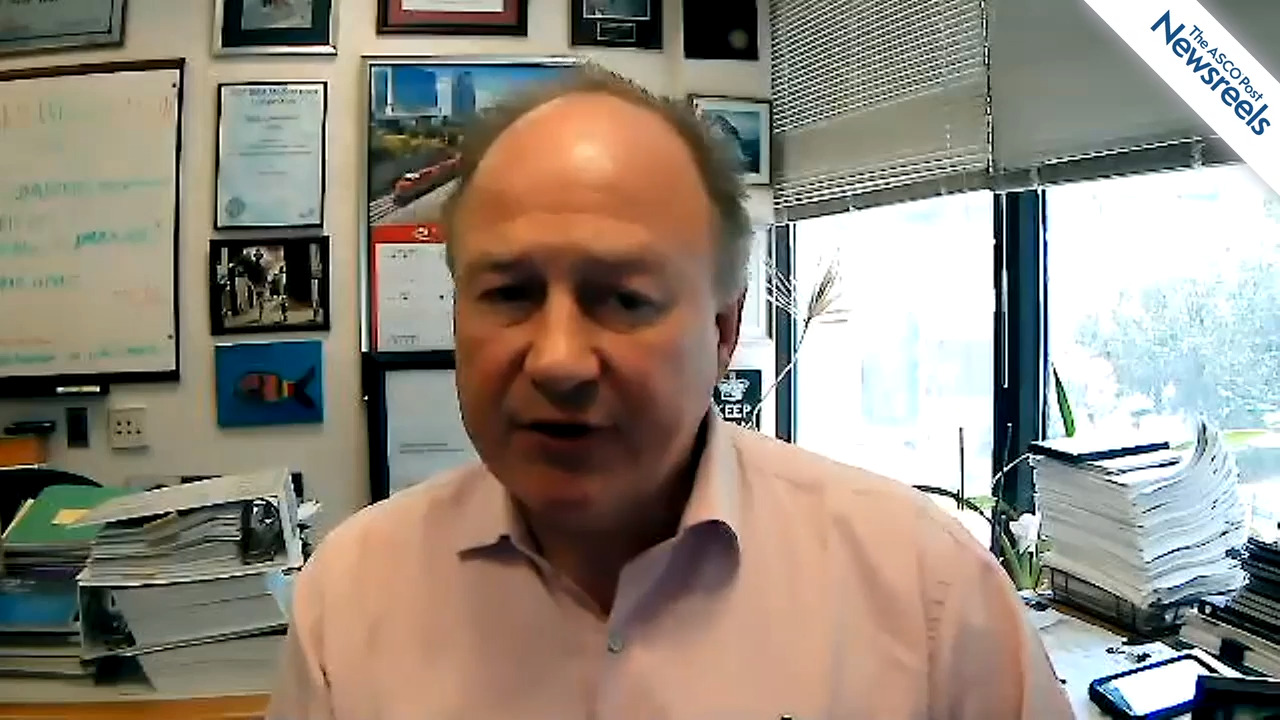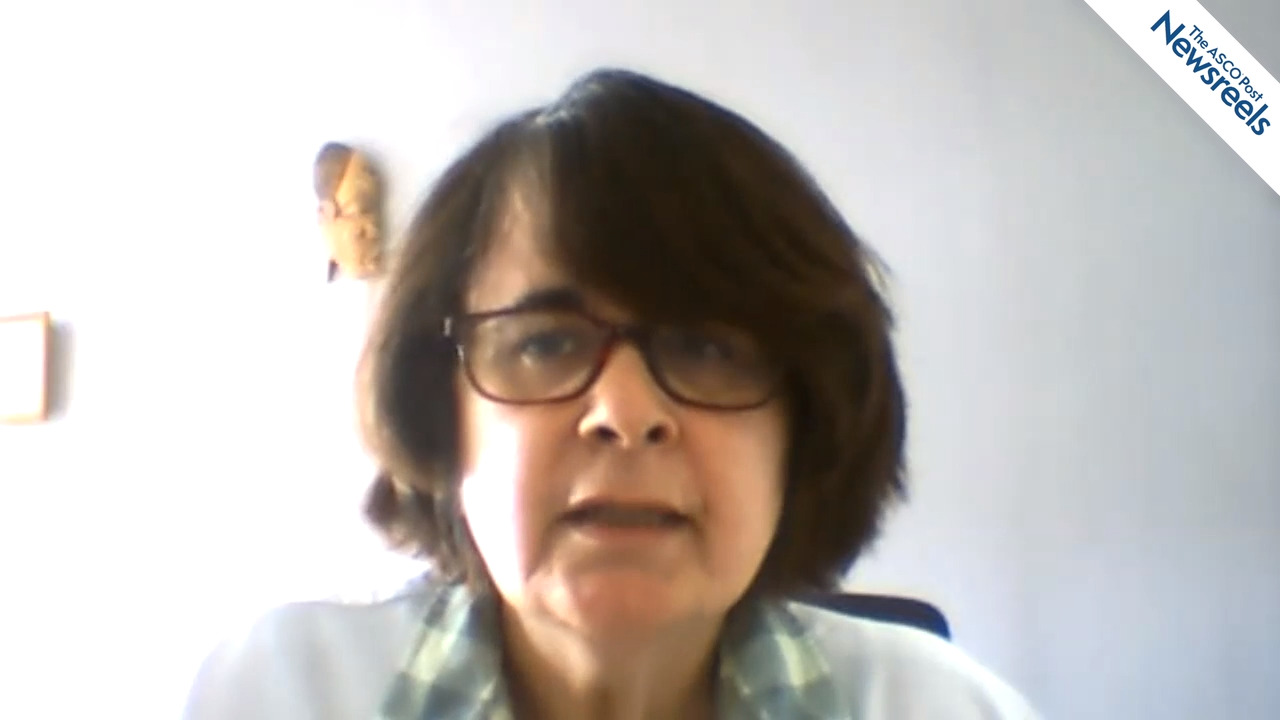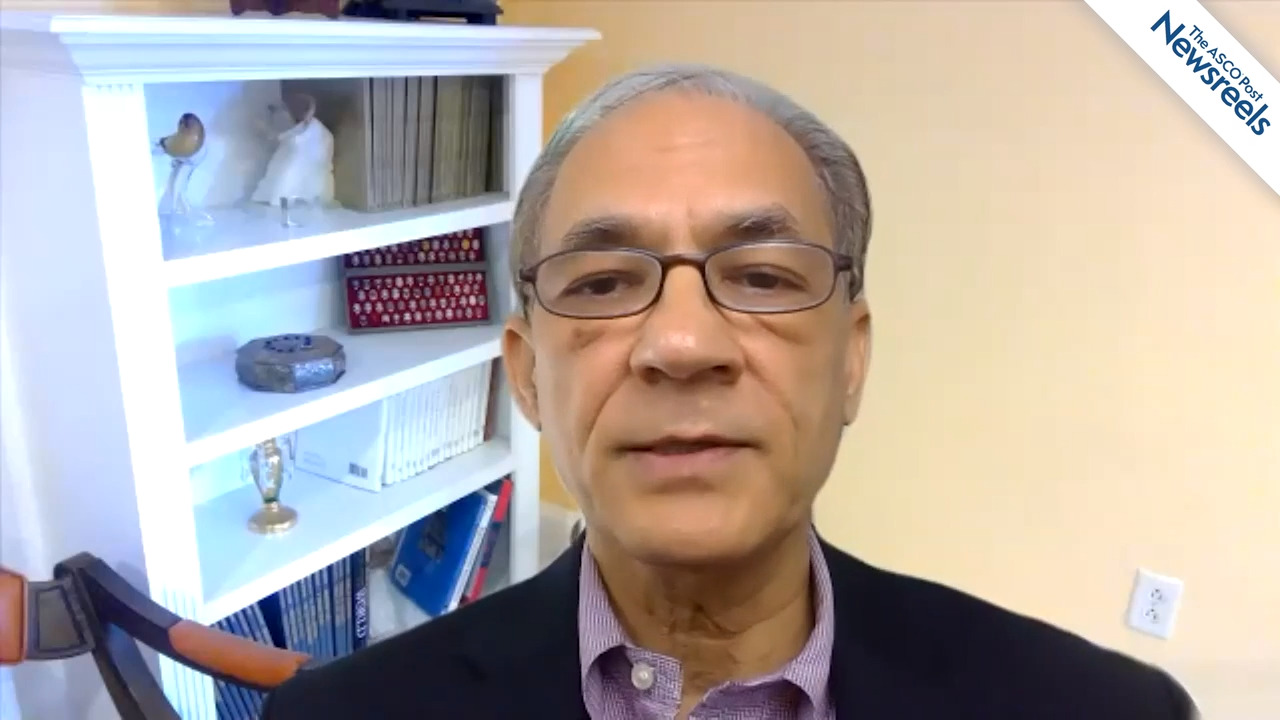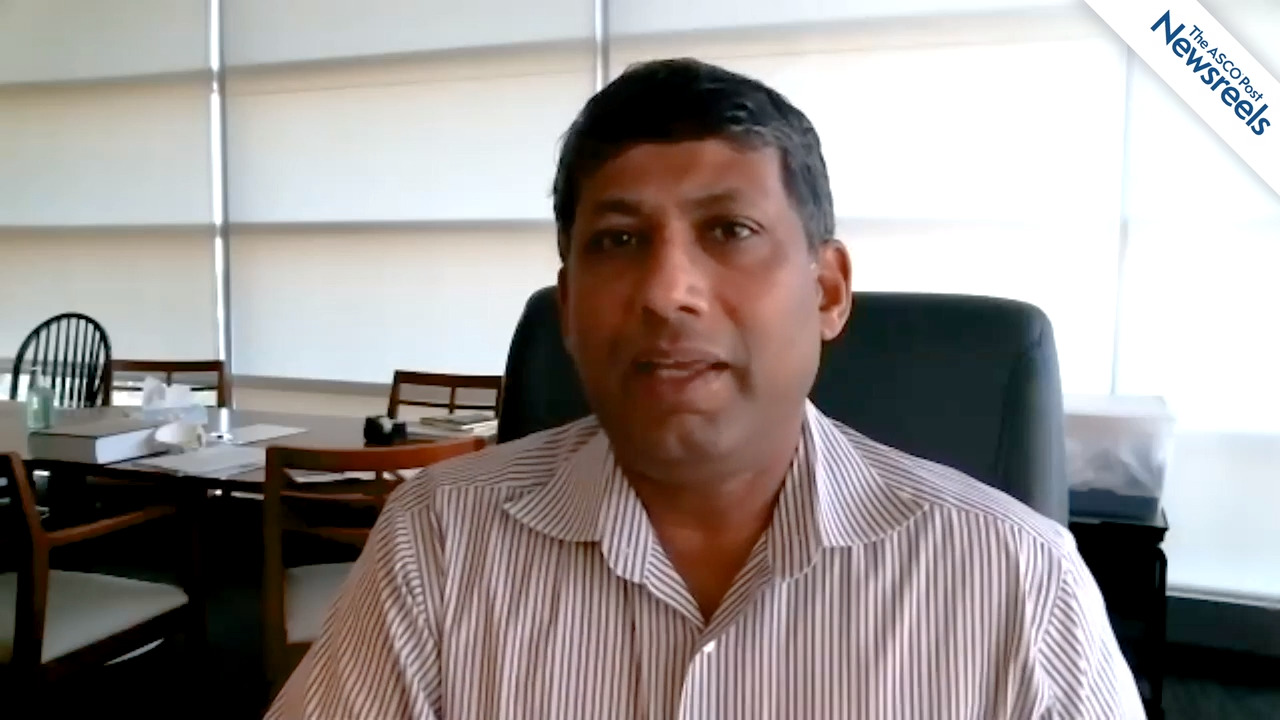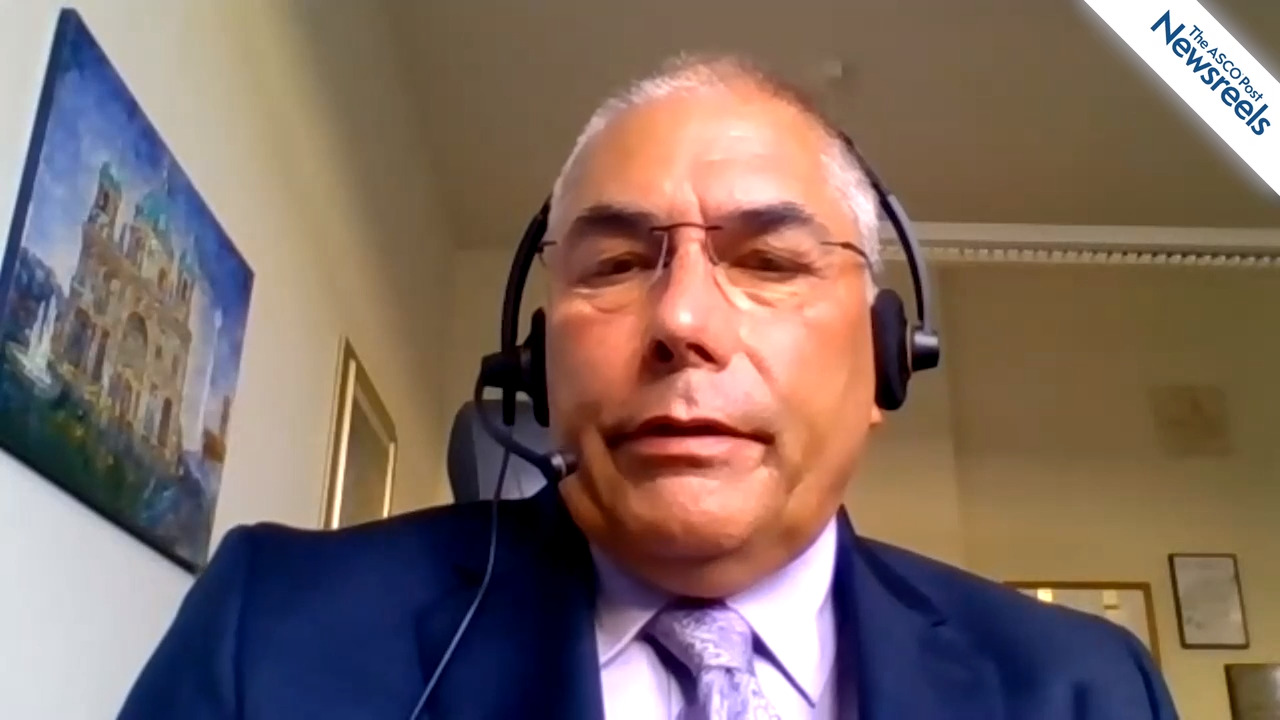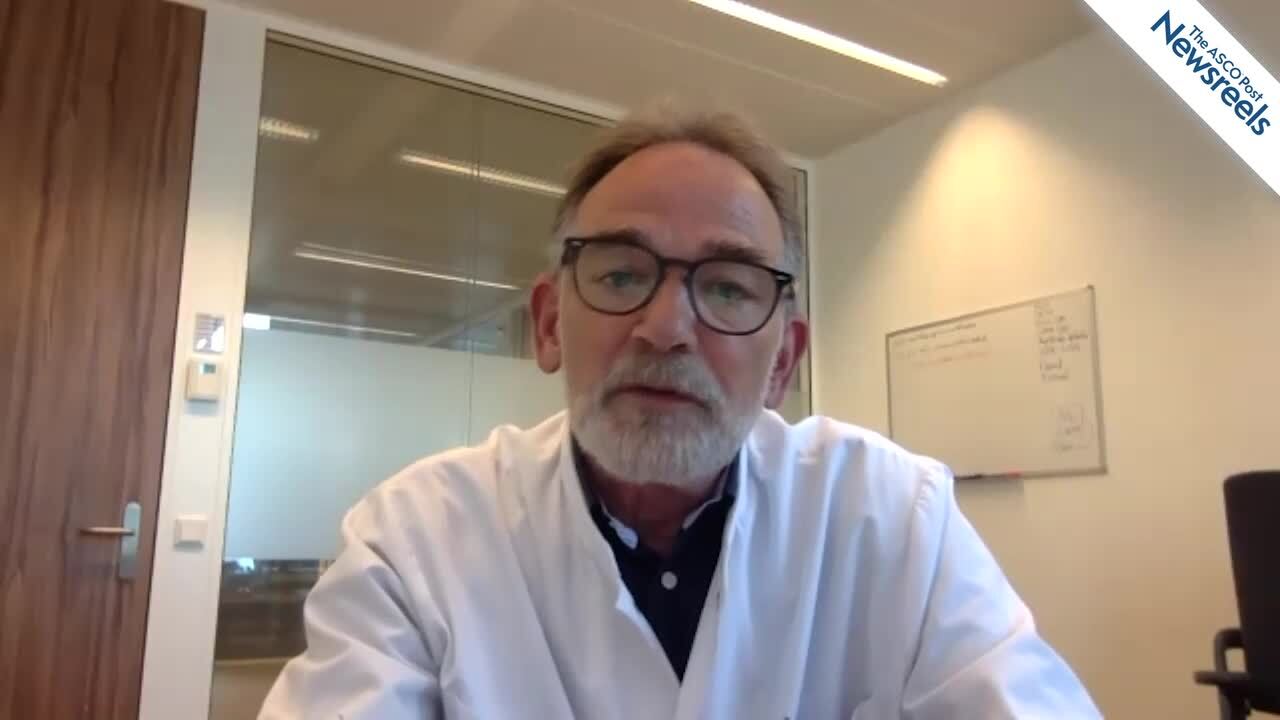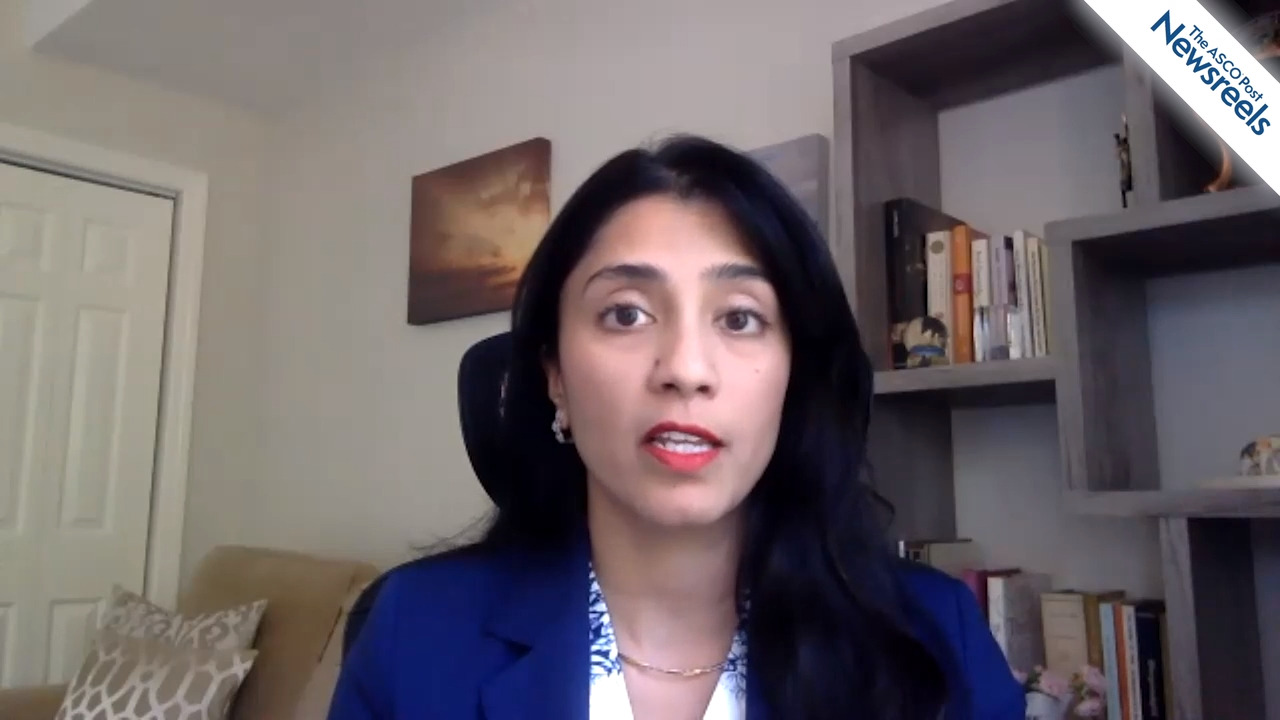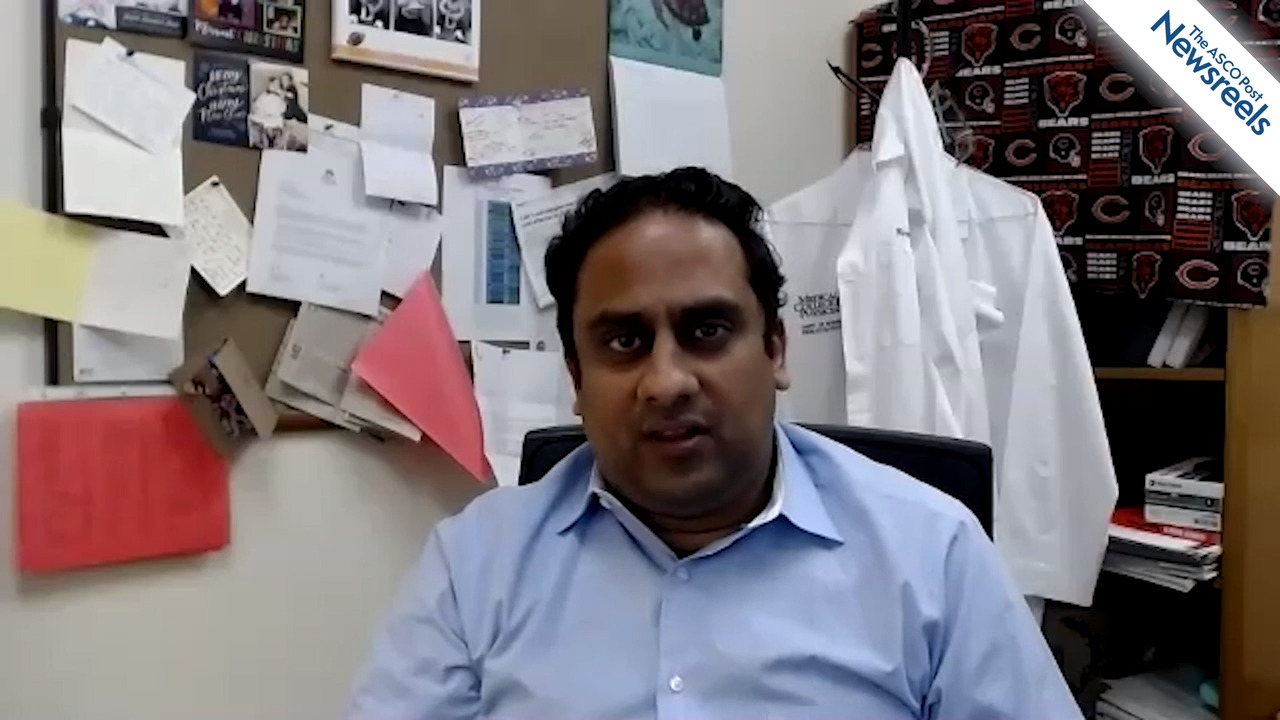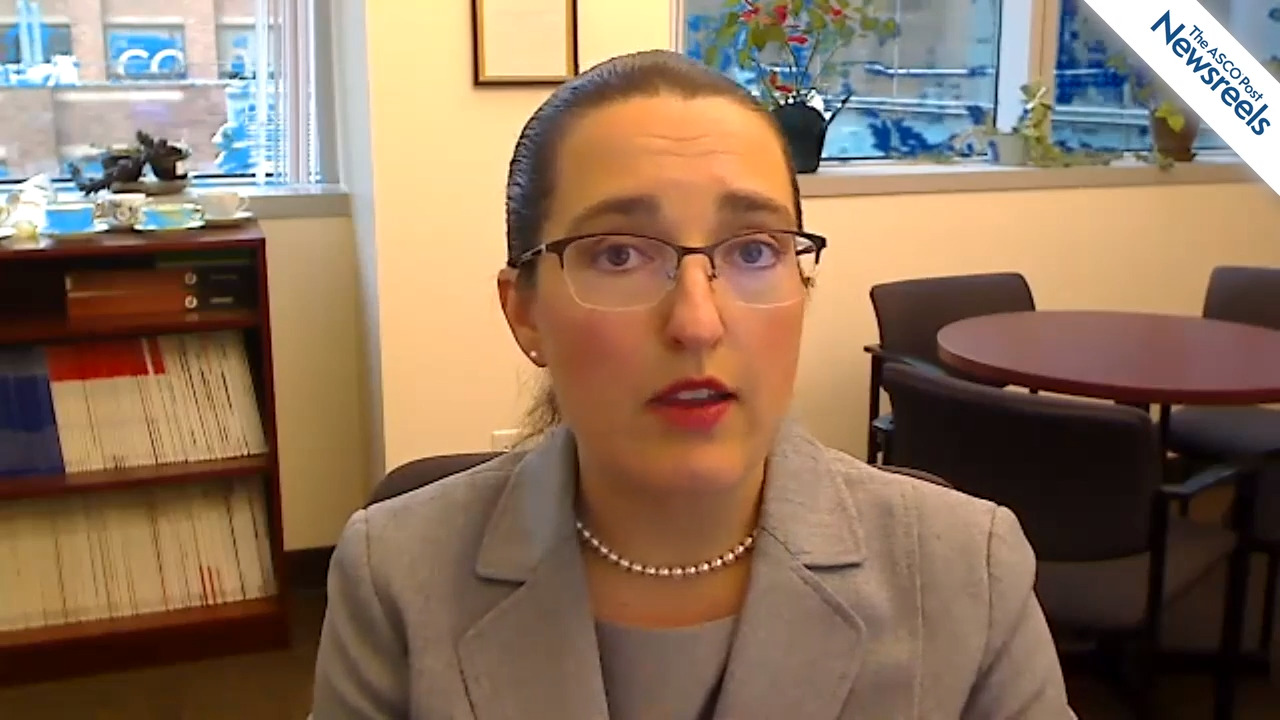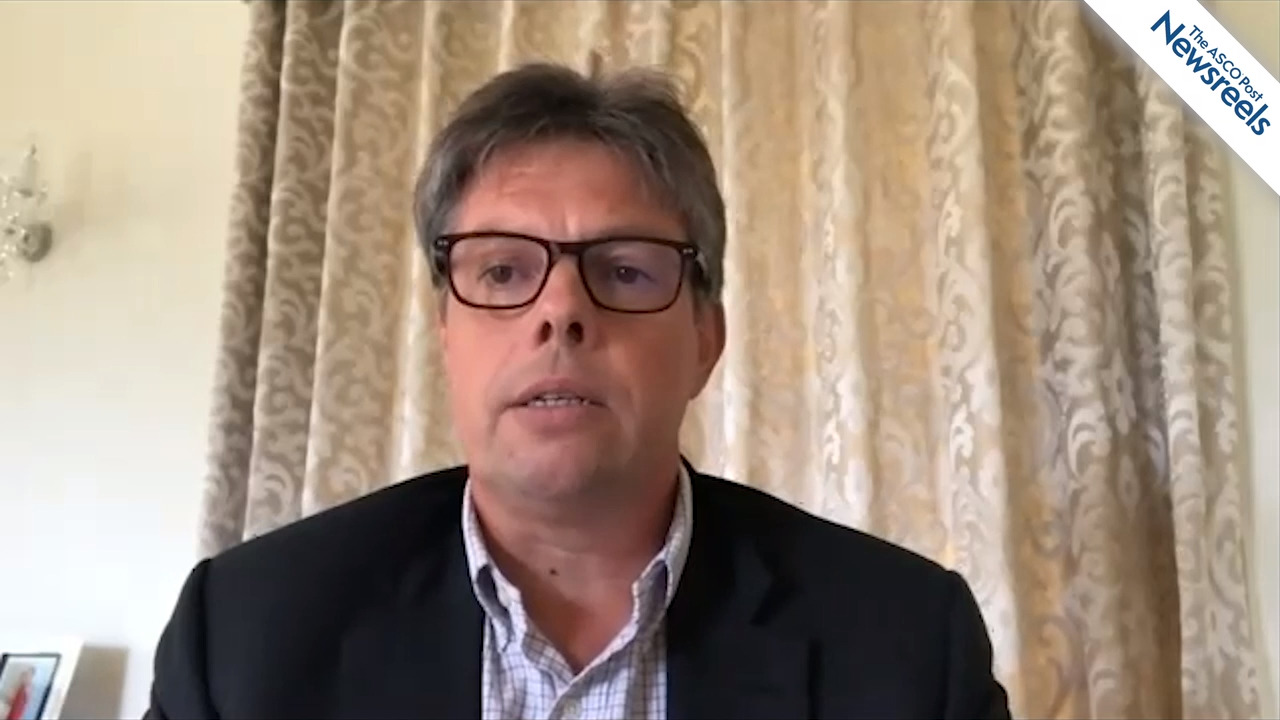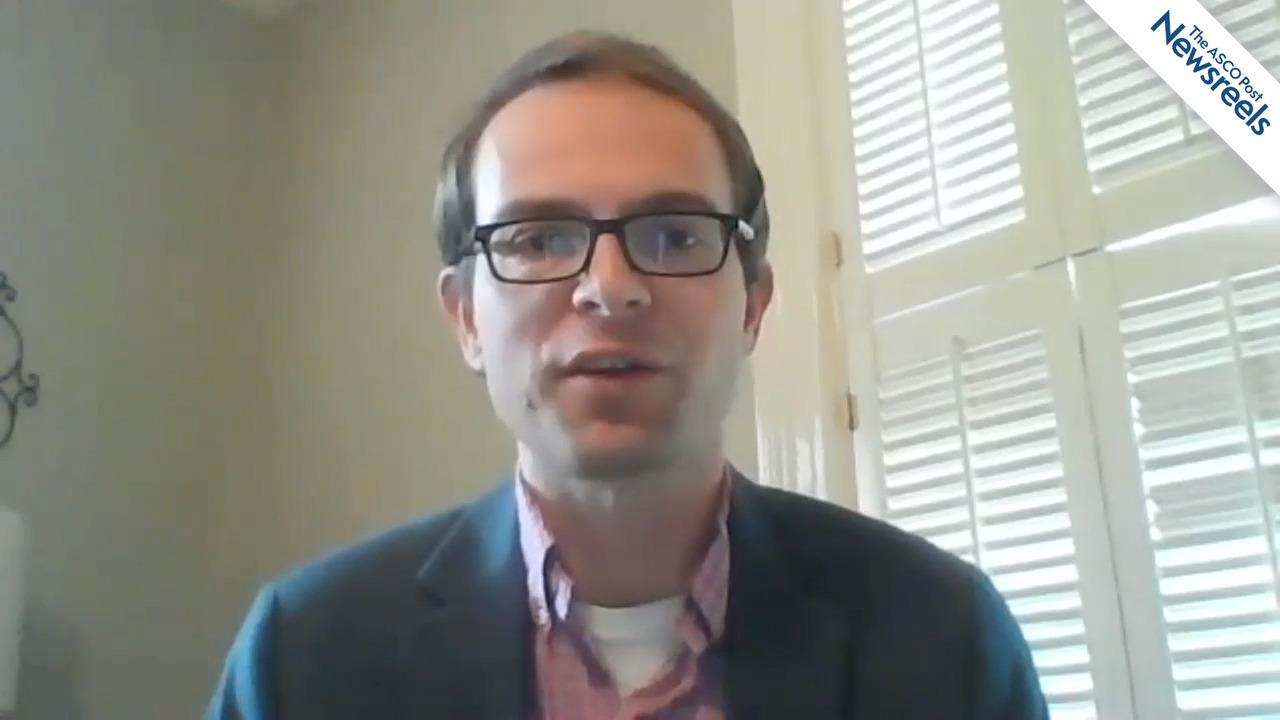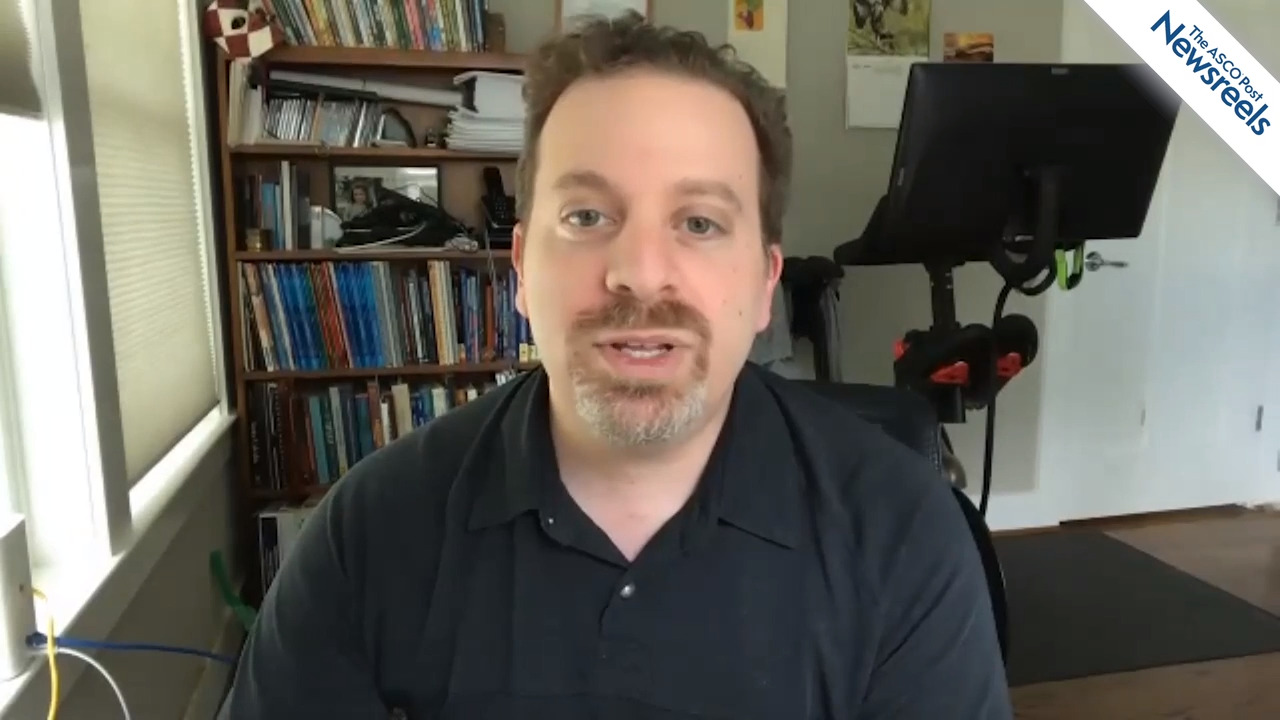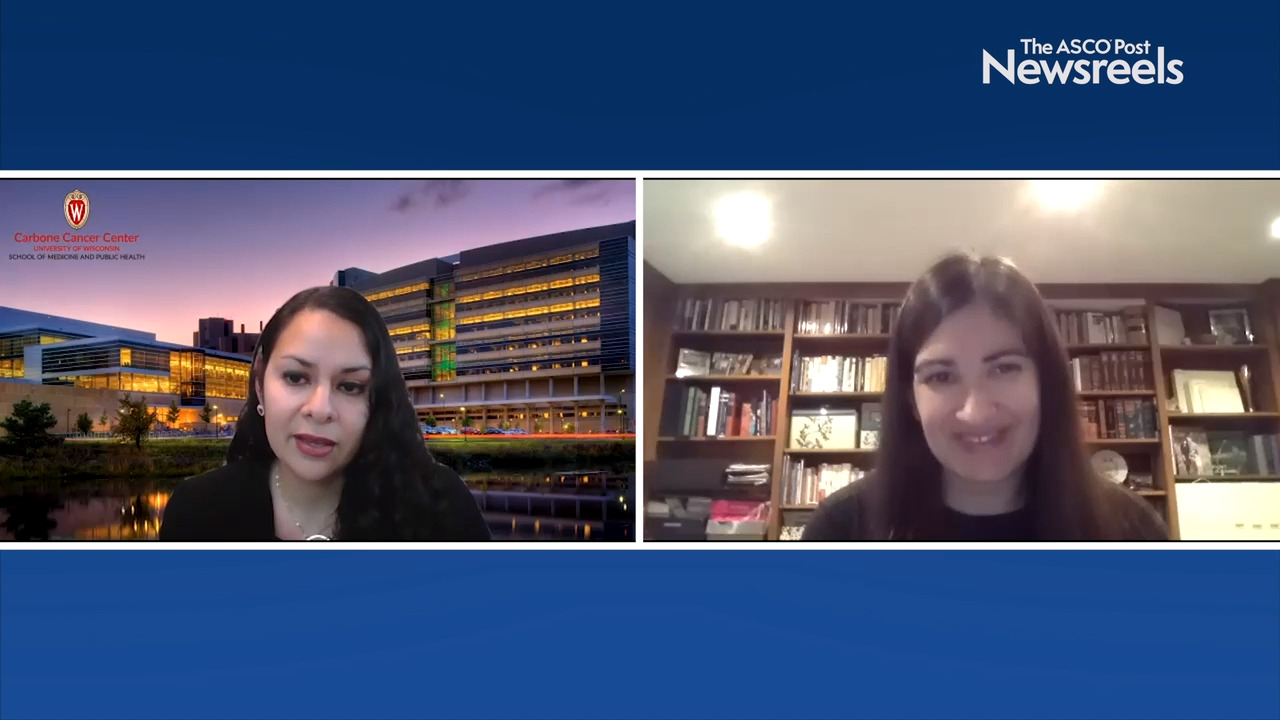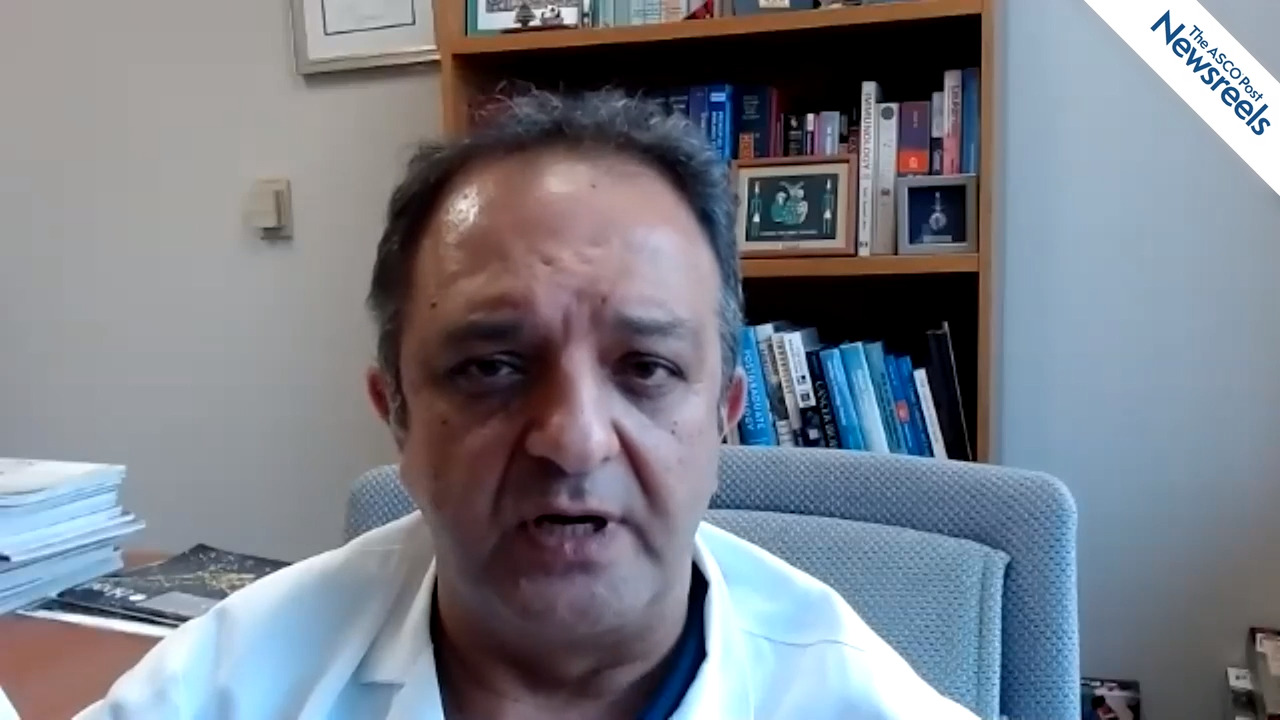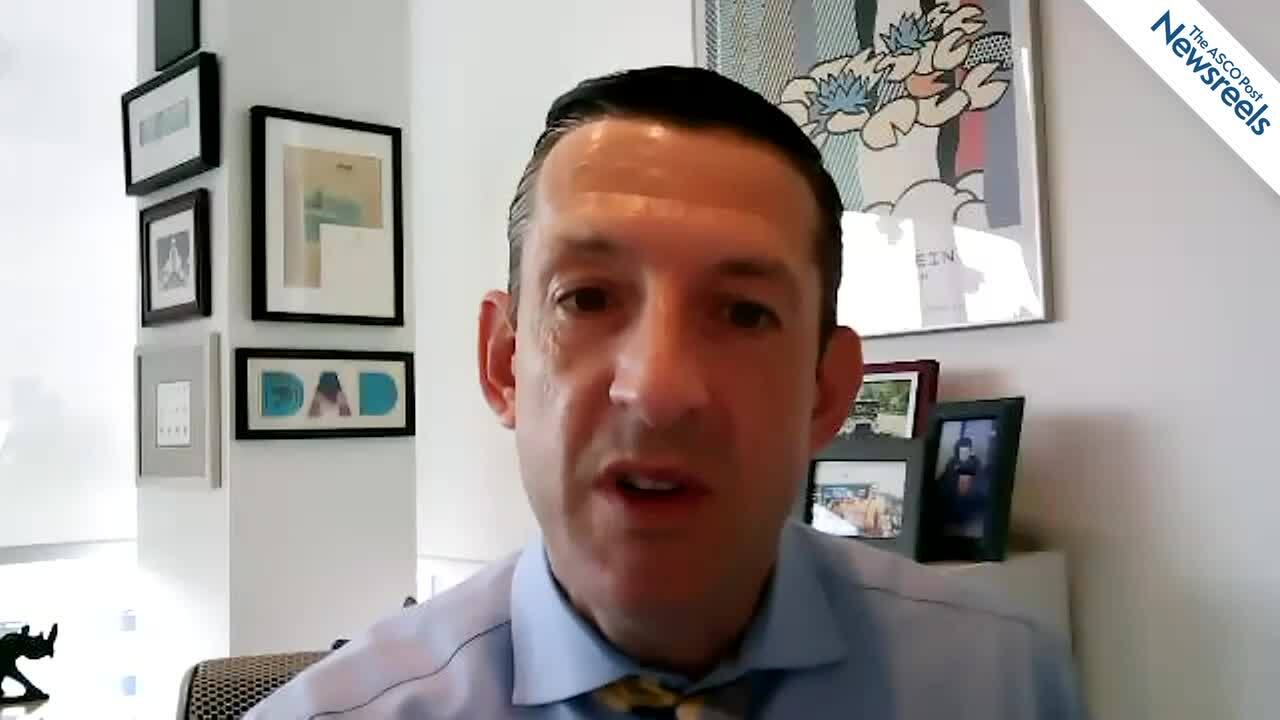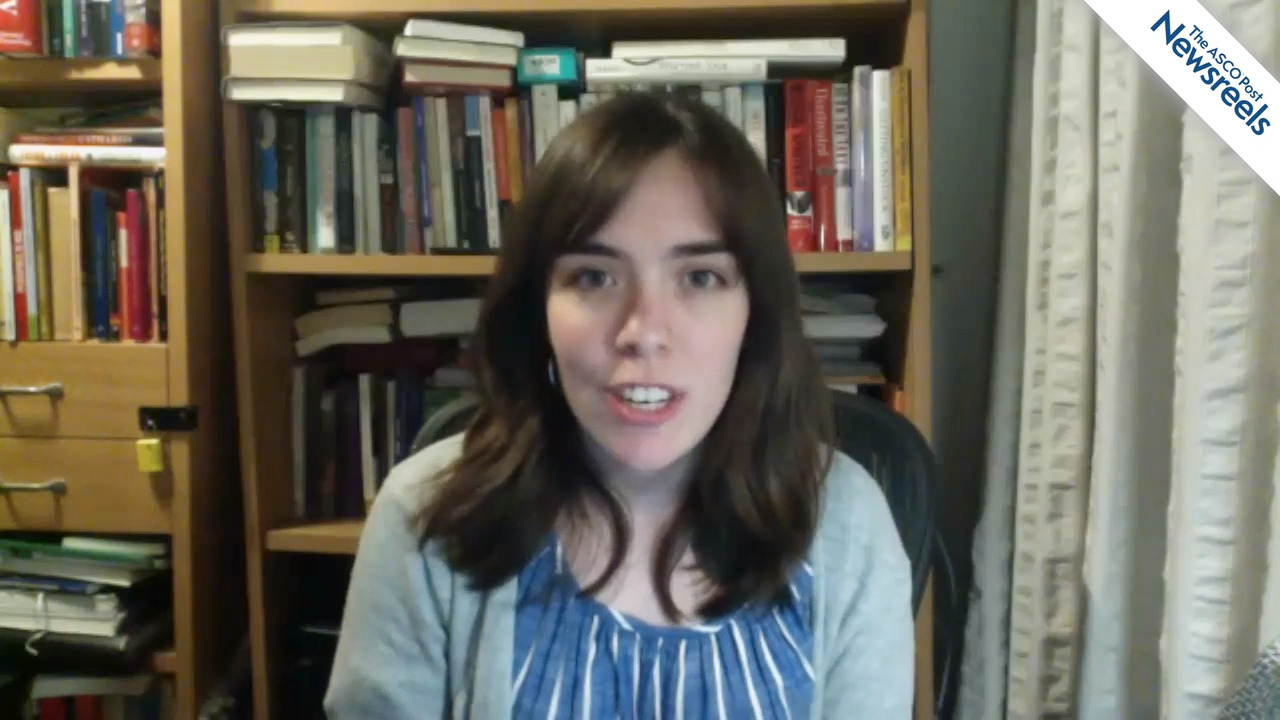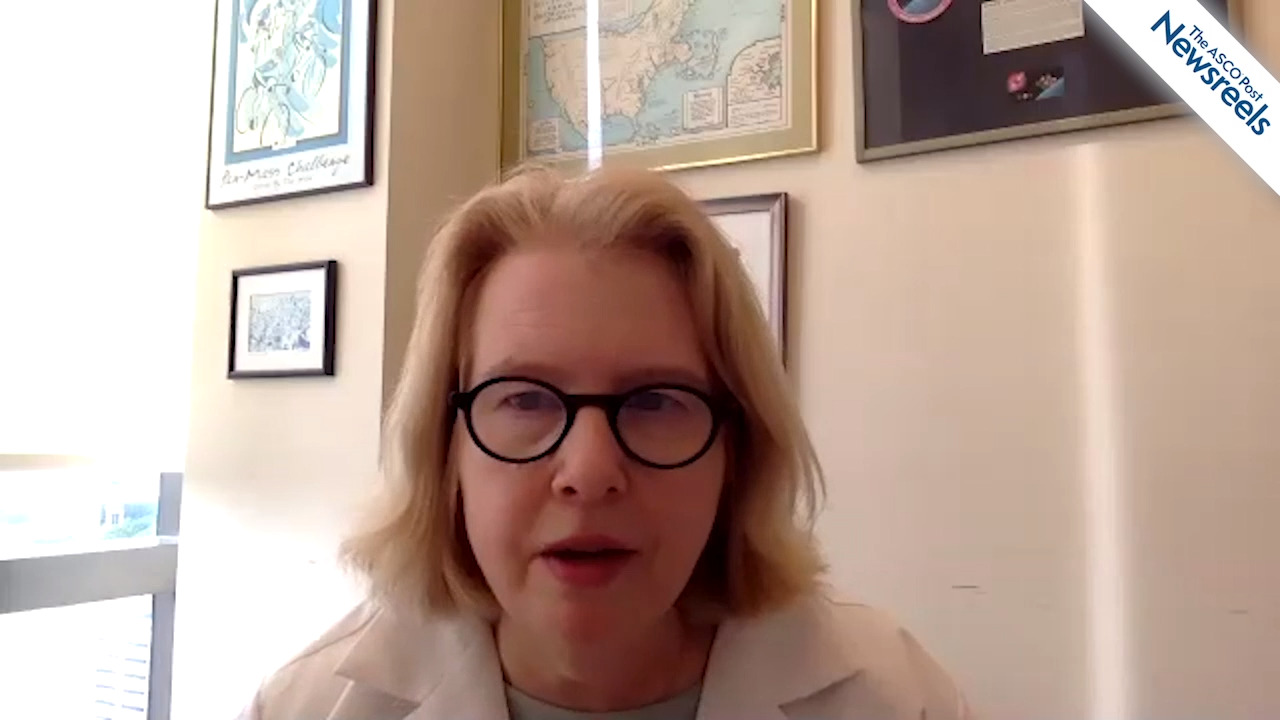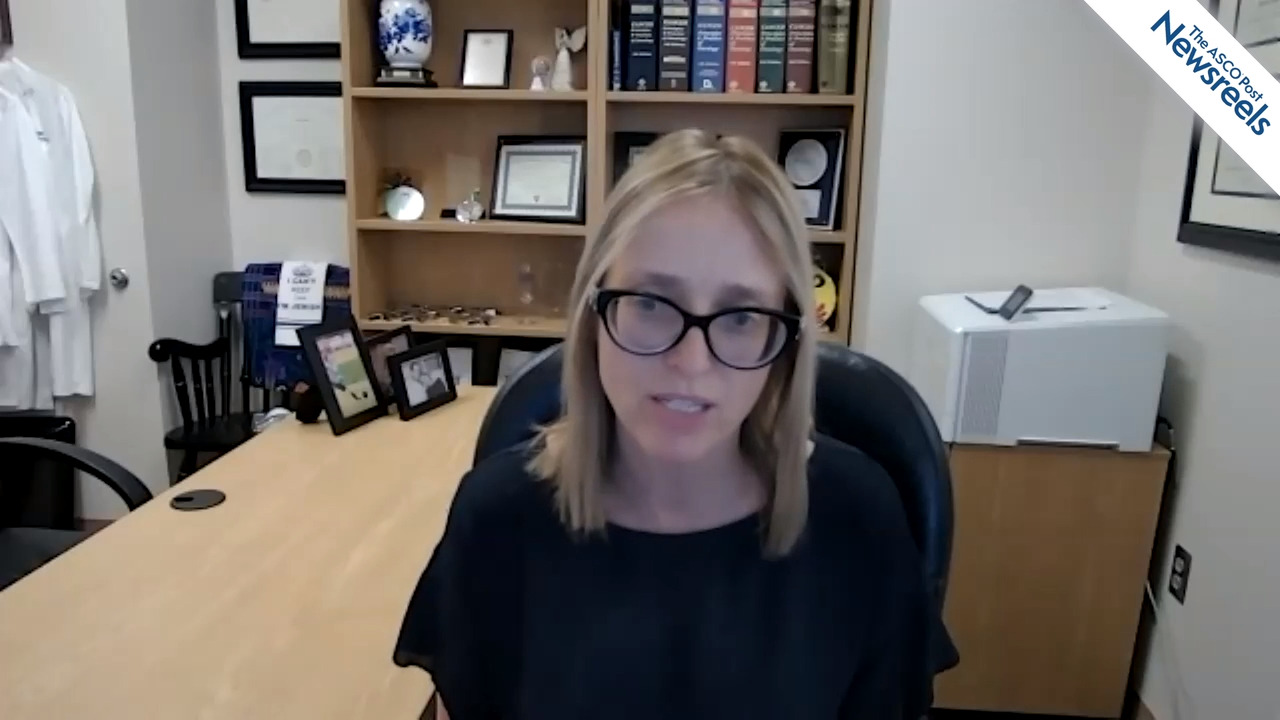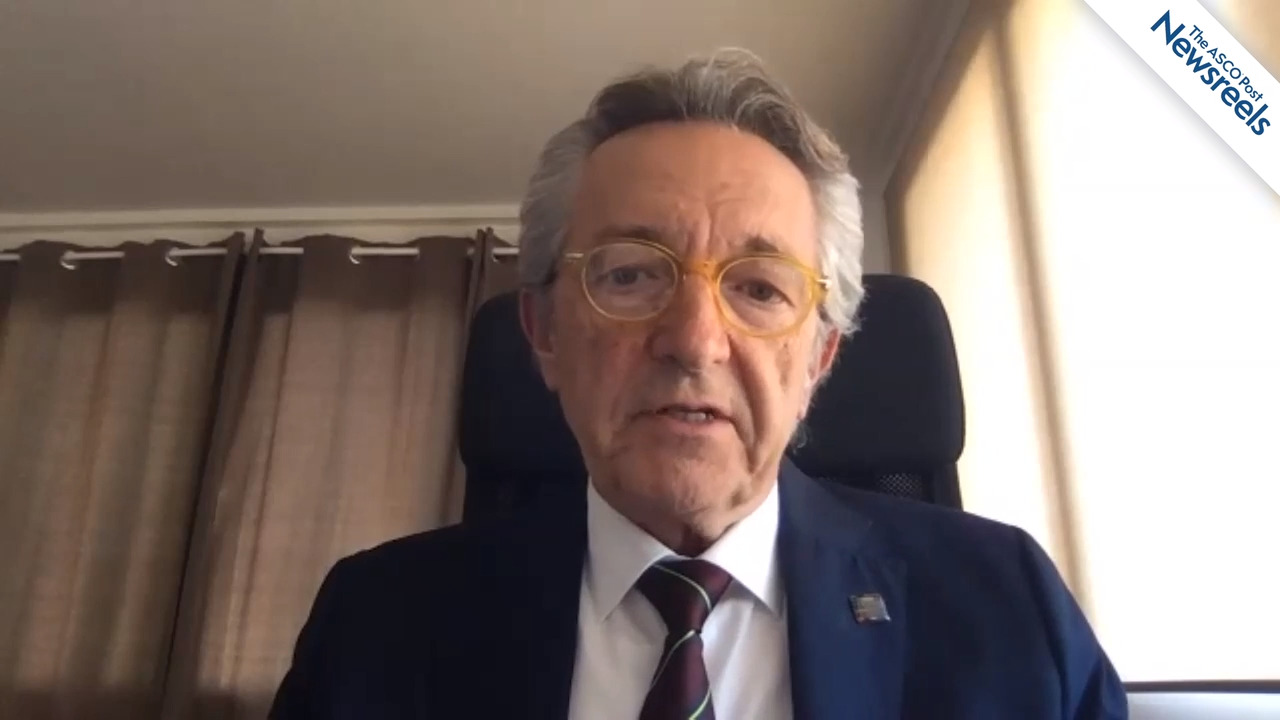ASCO20 Virtual Scientific Program
Expert Point of View: Jesús G. Berdeja, MD
The importance of first-line therapy in multiple myeloma is that the first therapy typically achieves the most impact, and subsequent lines of therapy tend to be less effective, explained ENDURANCE st...
Outcomes in Newly Diagnosed Multiple Myeloma Unimproved by Carfilzomib Triplet vs Standard Bortezomib-Based Regimen
No superior efficacy was shown with the combination of carfilzomib, lenalidomide, and dexamethasone (KRd) in newly treated patients with standard- and intermediate-risk multiple myeloma who are not sl...
Expert Point of View: Axel Grothey, MD
Sharing his perspective on KEYNOTE-177 with The ASCO Post was Axel Grothey, MD, Director of GI Cancer Research at the West Cancer Center, OneOncology, Memphis. “This is a very important, highly antici...
Rates of Progression-Free Survival in MSI-H/dMMR Metastatic Colorectal Cancer Doubled by Pembrolizumab
Upfront treatment with immunotherapy not only improved results in a subset of patients with metastatic colorectal cancer, it doubled the rates of median progression-free survival. These findings—the f...
Expert Point of View: Jonathan E. Rosenberg, MD
“These data are solid, showing a 7-month improvement in overall survival in patients with stable disease or better after first-line chemotherapy. This is roughly a 50% improvement in survival, which i...
Advanced Bladder Cancer Survival Improved With Maintenance Avelumab
According to an interim analysis of the phase III JAVELIN Bladder 100 trial, rates of survival among patients with advanced urothelial carcinoma who did not progress on first-line platinum-based chemo...
Expert Point of View: Lecia V. Sequist, MD
Lecia V. Sequist, MD, who was not involved in the ADAURA study, said this could be a practice-changing study. Dr. Sequist is the Landry Family Professor of Medicine at Harvard Medical School and Dire...
Conference Highlights From the ASCO20 Virtual Scientific Program
The global outbreak of the COVID-19 pandemic forced many cancer societies, including ASCO, to cancel their in-person meetings this year and instead present the latest advancements and new approaches i...
Sarah A. Holstein, MD, PhD, on Multiple Myeloma: Expert Perspective on Five Key ASCO20 Abstracts
Sarah A. Holstein, MD, PhD, of the University of Nebraska Medical Center, discusses top myeloma abstracts from the ASCO20 Virtual Scientific Program: the ENDURANCE trial on carfilzomib, lenalidomide, ...
Expert Point of View: Lynn Schuchter, MD, FASCO, and Ravi Salgia, MD, PhD
LYNN M. SCHUCHTER, MD, FASCO, Chief of Hematology/Oncology at the Penn Medicine’s Abramson Cancer Center, Philadelphia, was optimistic about the vaccine approach in this study. “We have seen broad use...
Study Supports Pembrolizumab Plus Axitinib in Previously Untreated Advanced Renal Cell Carcinoma
Extended analysis of the phase III KEYNOTE-426 study upholds pembrolizumab plus axitinib as a preferred front-line regimen over sunitinib in patients with advanced sporadic renal cell carcinoma.1 Thes...
Parameswaran Hari, MD, on Multiple Myeloma: Expert Commentary on Four Key Abstracts
Parameswaran Hari, MD, of the Medical College of Wisconsin, discusses data from four trials and their clinical implications for the treatment of patients with multiple myeloma: the KarMMa and EVOLVE s...
Novel Androgen-Deprivation Therapy With Relugolix Causes Fewer Cardiac Events Than Leuprolide in Advanced Prostate Cancer
Men with prostate cancer on androgen-deprivation therapy are usually treated with leuprolide, a long-acting injectable luteinizing hormone-releasing hormone (LHRH) agonist requiring an every-3-month i...
Study Finds Alpelisib Effective After CDK4/6 Inhibition in Advanced Breast Cancer
The PIK3CA inhibitor alpelisib appears to be effective in patients with PIK3CA-positive, hormone receptor–positive/HER2-negative advanced breast cancer previously treated with a cyclin-dependent kinas...
First-Line Pembrolizumab Added to Standard Chemotherapy Improved Progression-Free Survival in Extensive-Stage Small Cell Lung Cancer
Pembrolizumab added to etoposide and platinum significantly improved progression-free survival compared with placebo and etoposide/platinum as first-line therapy in patients with newly diagnosed, exte...
International Consortium Aims to Enhance Decision-Making in Hodgkin Lymphoma
Harmonization of big data in examining acute and long-term outcomes with contemporary treatment for pediatric and adult patients with Hodgkin lymphoma is yielding a new approach to inform future clini...
Highlights From Complementary and Integrative Medicine Research and Implications for Clinical Practice
Due to COVID-19, this year’s ASCO Annual Meeting was convened using a virtual format. It was multidisciplinary, featuring more than 250 oral and 2,500 poster presentations from around the world in 24...
Paul G. Richardson, MD, on Multiple Myeloma: First-in-Human Study of the Novel Agent CC-92480
Paul G. Richardson, MD, of Dana-Farber Cancer Institute, discusses early results on a cereblon E3 ligase modulator agent combined with dexamethasone in patients with relapsed or refractory multiple my...
Patricia Pautier, MD, on Leiomyosarcoma: Doxorubicin and Trabectedin for First-Line Treatment
Patricia Pautier, MD, of Institut Gustave Roussy, discusses final results of the phase II LMS-02 study, which showed the combination of doxorubicin and trabectedin to be an effective first-line therap...
Nikhil C. Munshi, MD, on Multiple Myeloma: Idecabtagene Vicleucel in Patients With Relapsed or Refractory Disease
Nikhil C. Munshi, MD, of Dana-Farber Cancer Institute, discusses initial results from the KarMMa tria, showing that idecabtagene vicleucel, a B-cell maturation antigen-targeted CAR T-cell therapy, dem...
Expert Point of View: Michael S. Lee, MD, and Autumn McRee, MD
DESTINY-CRC01 study discussant, Michael S. Lee, MD, Assistant Professor of Medicine, Lineberger Comprehensive Cancer Center, University of North Carolina, Chapel Hill, called the findings “most promis...
Trastuzumab Deruxtecan Shows Benefit in Refractory Colorectal Cancer
Having recently gained approval in metastatic breast cancer, fam-trastuzumab deruxtecan-nxki (T-DXd) is now proving its worth in metastatic colorectal cancer, according to results of the phase II DEST...
Parameswaran Hari, MD, on Multiple Myeloma: Post-Autologous Hematopoietic Cell Transplantation Strategies in Upfront Treatment
Parameswaran Hari, MD, of the Medical College of Wisconsin, discusses phase III data from a 6-year follow-up of the STaMINA trial, which compared progression-free survival among 758 patients with high...
Peter Reichardt, MD, PhD, on GIST: Adjuvant Imatinib for High-Risk Disease
Peter Reichardt, MD, PhD, of Helios Klinikum Berlin-Buch, discusses the 10-year survival analysis of 3 years vs 1 year of adjuvant imatinib for patients with high-risk gastrointestinal stromal tumor. ...
Positive Findings in NSCLC for First-Line Nivolumab Plus Ipilimumab With or Without Chemotherapy
It is becoming more challenging to select first-line therapy for advanced non–small cell lung cancer (NSCLC) for patients whose tumors have no EGFR or ALK alterations. The results of two different stu...
Egbert F. Smit, MD, PhD, on NSCLC: Treatment With Fam-trastuzumab Deruxtecan
Egbert F. Smit, MD, PhD, of the Netherlands Cancer Institute, discusses interim results from the DESTINY-Lung01 trial of fam-trastuzumab deruxtecan in patients with HER2-mutated metastatic non–small c...
Lakshmi Nayak, MD, on Primary CNS Lymphoma: The Search for Optimal First-Line Treatment
Lakshmi Nayak, MD, of Dana-Farber Cancer Institute, reviews two key abstracts on newly diagnosed primary central nervous system lymphoma and treatment with whole-brain radiotherapy, methotrexate, temo...
Suresh S. Ramalingam, MD, on NSCLC: Nivolumab Plus Ipilimumab vs Chemotherapy
Suresh S. Ramalingam, MD, of Emory University, discusses a 3-year update from the CheckMate 227, Part 1, trial, which showed that nivolumab plus ipilimumab continued to provide durable and long-term o...
Nirav Niranjan Shah, MD, on DLBCL: Autologous Transplant vs CAR T-Cell Therapy
Nirav Niranjan Shah, MD, of the Medical College of Wisconsin, explores whether autologous transplantation, in patients with relapsed diffuse large B-cell lymphoma who achieve only a PET/CT-positive pa...
Rachel E. Sanborn, MD, on NSCLC: Maximizing the Benefits of Targeted Therapies for EGFR-Mutated Disease
Rachel E. Sanborn, MD, of the Providence Cancer Institute, discusses three key abstracts on EGFR-mutated non–small cell lung cancer: a final overall survival analysis of bevacizumab plus erlotinib; co...
Christopher Nutting, MD, PhD, on Head and Neck Cancer: Dysphagia-Optimized vs Standard IMRT
Christopher Nutting, MD, PhD, of the Royal Marsden Hospital and Institute of Cancer Research, discusses phase III results from the first study to demonstrate the functional benefit of swallow-sparing ...
Immunogenomic Characteristics of Advanced Clear Cell Kidney Cancer Treated With Checkpoint Inhibitors
By analyzing tumors from patients treated with immunotherapy for advanced kidney cancer in three clinical trials, scientists have identified several features of the tumors that influence their respons...
Douglas B. Johnson, MD, on Melanoma: Clinical Trials Update on PD-1 and CTLA-4 Blockade
Douglas B. Johnson, MD, of Vanderbilt University Medical Center, discusses three important melanoma abstracts: the need for more than two doses of nivolumab plus ipilimumab in combination immunotherap...
Jeremy L. Warner, MD, on the Clinical Impact of COVID-19 on Patients With Cancer
Jeremy L. Warner, MD, of Vanderbilt-Ingram Cancer Center, discusses data from the COVID-19 and Cancer Consortium cohort study, which included patients with active or prior hematologic or invasive soli...
Immune Checkpoint Inhibitor Rechallenge in Metastatic Renal Cell Carcinoma
In a study presented at the ASCO20 Virtual Scientific Program (Abstract 5077) and published as a brief report in JAMA Oncology, Ravi et al found that rechallenge with immune checkpoint inhibitor thera...
Expert Point of View: Julia R. White, MD
Julia R. White, MD, Professor of Radiation Oncology at The Ohio State University, Columbus, and the invited discussant of E2108, put these findings into context with three important studies evaluating...
Study Finds No Survival Benefit From Local Therapy for de Novo Metastatic Breast Cancer
Women presenting with newly diagnosed de novo metastatic breast cancer derived no additional survival benefit from surgery and radiotherapy given after systemic treatment, although the practice may re...
Reshma Jagsi, MD, DPhil, and Narjust Duma, MD, on Diversity in Oncology: A Discussion of Evidence-Based Transformation
Reshma Jagsi, MD, DPhil, of the University of Michigan, and Narjust Duma, MD, of the University of Wisconsin Carbone Cancer Center, discuss the state of diversity in the hematology-oncology workforce,...
Expert Point of View: Jesús G. Berdeja, MD
The importance of first-line therapy in multiple myeloma is that the first therapy typically achieves the most impact, and subsequent lines of therapy tend to be less effective, explained ENDURANCE st...
Carfilzomib Triplet Fails to Improve Outcomes vs Standard Bortezomib-Based Regimen in Newly Diagnosed Myeloma
For newly treated patients with standard- and intermediate-risk multiple myeloma who are not slated for immediate autologous stem cell transplantation (ASCT), the triplet regimen of carfilzomib/lenali...
Farhad Ravandi-Kashani, MD, on Acute Myeloid Leukemia: AMG 330 in Patients With Relapsed or Refractory Disease
Farhad Ravandi-Kashani, MD, of The University of Texas MD Anderson Cancer Center, discusses updates from a phase I dose-escalation study of AMG 330, a bispecific T-cell engager molecule. It showed ear...
Mikkael A. Sekeres, MD, on MDS, CMML, or AML: Pevonedistat and Azacitidine
Mikkael A. Sekeres, MD, of the Cleveland Clinic, discusses data from a phase II study of pevonedistat plus azacitidine vs azacitidine alone in patients with higher-risk myelodysplastic syndromes, chro...
Lourdes Gil Deza on Caring for Transgender Patients With Cancer
Professor Lourdes Gil Deza, of the Instituto Oncológico Henry Moore, Buenos Aires, discusses her findings on the shortcomings of medical training when it comes to treating transgender patients, and th...
Expert Point of View: TROPHIMMUN Trial
Two gynecologic oncologists and ASCO’s Chief Medical Officer and Executive Vice President Richard L. Schilsky, MD, FACP, FSCT, FASCO, commented on the findings of the TROPHIMMUN trial for The ASCO Pos...
Expert Point of View: Scott T. Tagawa, MD, MS
Discussant Scott T. Tagawa, MD, MS, of Weill Cornell Medicine, New York, agreed that prostate-specific membrane antigen (PSMA)-targeted positron-emission tomography (PET) is the wave of the future, bu...
Ursula A. Matulonis, MD, on Ovarian Cancer: Roundup of Studies on Olaparib, Cediranib, Mirvetuximab Soravtansine, Bevacizumab, and Pembrolizumab
Ursula A. Matulonis, MD, of Dana-Farber Cancer Institute, discusses three important studies focusing on newer therapies for patients with recurrent platinum-sensitive, platinum-agnostic, and advanced ...
Leora Horn, MD, on Thoracic Cancer and COVID-19: How Type of Cancer Therapy May Affect Survival
Leora Horn, MD, of Vanderbilt University, discusses the results of the TERAVOLT study, launched by the Thoracic Cancers International COVID-19 Collaboration. It examined the impact of specific chemoth...
Daniel P. Petrylak, MD, on Prostate Cancer: First-in-Human Study of ARV-110 Shows Antitumor Activity
Daniel P. Petrylak, MD, of the Yale Cancer Center, discusses early data on ARV-110, an androgen receptor proteolysis–targeting chimera degrader, demonstrating antitumor activity in metastatic castrati...
Andres Poveda, MD, on Ovarian Cancer: Assessing Maintenance Olaparib
Andres Poveda, MD, of Initia Oncology, discusses phase III results from the SOLO2 trial, which showed that, compared with placebo, maintenance olaparib improved median overall survival by 12.9 months ...
Howard A. Burris III, MD, FACP, FASCO, on the ASCO20 Virtual Scientific Program: After Action Report
Howard A. Burris III, MD, FACP, FASCO, Immediate Past President of ASCO and current Society Board Chair, talks about how the meeting went, with its record-breaking attendance and new format.
